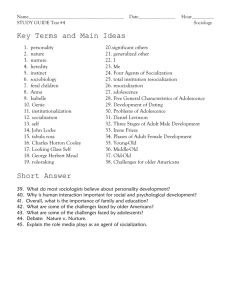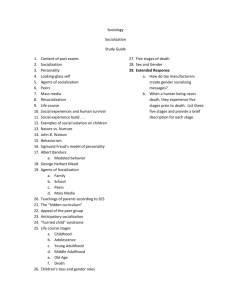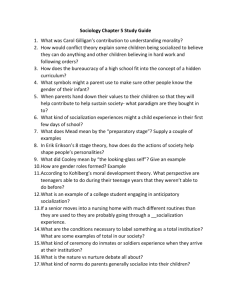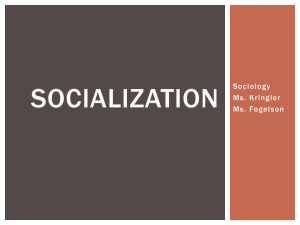Socialization - Mrs. Silverman: Social Studies
advertisement
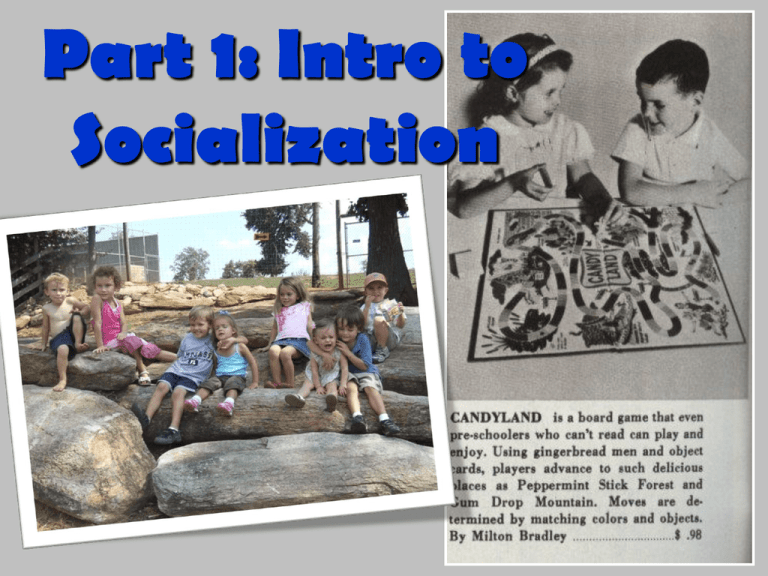
Part 1: Intro to Socialization What is Socialization? • DEFINITION: the process by which individuals learn the ways of society and culture (basic skills, values, beliefs and appropriate behavior) • Necessary for a successful existence • Lifelong process The Big Questions of Socialization • How do we learn to get along with others? The Big Questions of Socialization • How do we learn to view ourselves as one among others? • How do others influence us? Part 2: The Social Experience What is Personality? • DEFINITION: the sum total of behaviors, attitudes, beliefs & values that are characteristic of an individual • Determines how we adjust to our environment & how we react in certain situations Personality Development: Nature v. Nurture • Charles Darwin (SOCIOBIOLOGY; NATURE): • All human behavior is instinctive; inherited behavioral patterns • John B. Watson (BEHAVIORISM; NURTURE): • All human behavior can be taught and learned Nature or Nurture? • Brown eyes • Enjoys bungee jumping • 6’ tall • Red hair • IQ of 150 Nature or Nurture? • • • • Weighs 500 pounds Depressed Alcoholic Has cancer Personality Development: Nature v. Nurture • Twin Studies: • Used to determine heritability; VERY important in understanding the role of genes and environment in forming an individual Personality Development: Nature v. Nurture • Premise: • Since identical twins have identical genes, differences between them are solely due to environmental factors Personality Development: Nature v. Nurture • Elyse Schein and Paula Bernstein • A classic twinning study • http://www.youtube.com/watch?v=0yTCShemS_0 The Sociological View • Sociologists believe personality development, or a fairly consistent pattern of acting, thinking and feeling is shaped by BOTH biology and social experience Personality Development: Nature v. Nurture • 4 Factors That Influence Personality: • Heredity • Birth Order • Parents • Cultural Environment Heredity • Definition: • Transmission of genetic characteristics from parents to children • Includes aptitude – capacity to learn a particular skill or acquire a particular body of knowledge Birth Order • Research indicates that birth order DOES have an influence on personality development • ONLY CHILDREN: tend to endure pressure to achieve & excel; overactive and socially involved ; many are leaders; often worrisome Birth Order • OLDEST CHILDREN: tend to share traits with only children; cautious & achievement oriented • SUBSEQUENT CHILDREN: better in social relationships; more affectionate; friendly & creative; more sensitive & humorous Silverman’s Class: Birth Order & Average GPA • • • • • • • 2nd Period: Oldest/Only Child: 8 Numeric Avg: 90.1 Middle Child: 7 Numeric Avg: 83 Youngest Child: 11 Numeric Avg: 88.4 • • • • • • • 4th Period: Oldest/Only Child: 10 Numeric Avg: 90.3 Middle Child: 6 Numeric Avg: 86.8 Youngest Child: 8 Numeric Avg: 90.1 Parents • A child’s FIRST attachment is to his or her mother • Later, both parents serve as role models & shape perception of sex roles & family members • Parental characteristics can influence level of education, religious affiliation, cultural heritage, economic status and occupation Cultural Environment • A society’s cultural environment may determine which personality traits are emphasized • For example, American culture emphasizes competition and success Social Isolation • Effects on Nonhuman Primates: • The Harry Harlow Experiments • Results? Social Isolation: Effect on Children • • • • • • • Feral Children: Wild or untamed children Raised in isolation Case Studies: Anna & Isabelle Genie, “The Wild Child” Results? Part 3: The Process of Socialization Much research forms the basis for our understanding of human development… The Concept of Self • Definition: your conscious awareness of possessing a distinct identity that separates you and your environment from other members of society • How do you develop a sense of self? Charles Horton Cooley: The Looking Glass Self • The Looking Glass Self: • Developing an image of oneself based on how we think others see us • “I am, who I think, you think I am.” George Herbert Meade: The Social Self • Role Taking: • Take roles of others in society to better understand what YOUR expectations are • Usually starts with your closest relationships “significant others” • We internalize the attitudes, expectations, and viewpoints of society – the “generalized other” George Herbert Meade: The Social Self • I and ME • I is the unsocialized spontaneous, self-interested component of personality & self-identity • ME is the part of ourselves that is aware of the expectations and attitudes of society – the socialized self • In childhood, the I component is stronger than the ME Part 4: Agents of Socialization Agents of Socialization • • • • Family Peer Group School Mass Media Agents of Socialization • The FAMILY: Structured • Principal agent of ALL children (0-adolescense) • Can be deliberate or unconscious • EXAMPLES: • Deliberate socialization? • Unconscious socialization? Are your personality traits similar to those of your parents? • I’m mostly influenced by my parents. They’re the ones who taught me right from wrong and have shaped my personality. • I’m usually late or running late for events…which is just like my mom. • I think I learned my sense of humor from my dad. • I always want to be on time like my parents. They say, “If you’re not early, you’re late.” • I am influenced by my dad. He has taught me that hard work in school pays off for the rest of your life. • I sometimes say what I mean without meaning to! This is like my dad – he tells people what he thinks. • My mom does not, will not, ever lie. I can’t help but be honest no matter what. If you have a booger I will tell you. • Like my mom, I try to hide emotions to appear strong. • I’ve learned from watching my dad it’s easier to be calm during arguments. Agents of Socialization • The PEER GROUP: Loose • Primary group; composed of those similar in age & background • Increasing importance during adolescence; focuses on the skills necessary to “fit in” to subculture • Group goals are often at odds with societal goals Do your friends influence your behavior? • Yes, they influence me to be more outgoing. For example, I do not like to dance, but if I ever go dancing with my friends, I take on their positive energy and try to get myself out there. • I think my sarcasm and wit is influenced by my friends. • I mimic what they are doing to avoid conflict. • I guess they make me want to fit in as much as possible. I always try to please people. • Yes, I act crazy around my friends. I can be with my friends and just say and do random things that I wouldn’t normally do. • I notice that I have polite friends so it encourages me to stay polite as well…my friends and I tend to wear the same clothing. • Sometimes they influence me when they’re studying and I am too lazy to study, but I end up studying with them. • I think we pick up on similar behavior. For example, my best friend always says “swag” so now I say it. • I find myself doing things that my friend want to do even if I would have never done it on my own. Agents of Socialization • • • • The SCHOOL: Highly Structured Deliberate socialization EXAMPLES: Class activities/academic subjects • Values education • ***Peer groups present; family involvement Agents of Socialization • The MASS MEDIA: Loose • TV, radio, magazines, internet, newspaper, etc. • Unconscious socialization (debatable) • Most influential form of mass media? • Television (98% of homes; 7 hours/day) Agents of Socialization • Positive Impact of Mass Media: • Exposure to certain elements of society that one might not otherwise be exposed to • Negative Impact of Mass Media: • Exposure to violence • Impact of “popular” culture Are you influenced by the media? • Yes…if I see someone famous on TV with some good looking shoes, I want to go buy them. • Mass media has influenced me in a way that I’m somewhat addicted to knowing what’s going on outside my life. • If I see an ad for a product, it may make me want to use it. • Yes, for example, certain news programs and channels impact how I feel on the government and government issues. • It influences the clothes I wear, type of music I listen to, type of language I use. It also shapes what I value in the world…famous people, clothes, money. • Yes, it affects my dress and what I think is “cool.” • Yes, it has made me more aware of appearances and what “right” and “wrong” actions are. • I think TV and media make living an adult life as a teenager more normal. Agents of Socialization • Secondary Agents of Socialization: • Clubs & Organizations (Boys Scouts, etc.) • Religious Affiliation • Government • Ethnic Group • Work Agents of Socialization • • • • • Total Institutions: Isolates members from the rest of society EXAMPLES: Prisons, psychiatric hospitals, monasteries Generally, the primary goal of total institutions is to RESOCIALIZE, or the break with past experiences & learn new values Part 5: Socialization & the Life Course Stage 1: Childhood • Childhood: • First 12 years of life • Characterized by a certain level of freedom from responsibilities • Must acquire key life lessons Stage 2: Adolescence • Definition: • The period between the normal onset of puberty and the beginning of adulthood • Puberty: • The physical maturing that makes an individual capable of sexual reproduction • In the U.S., generally considered ages 12 to 19…now 25? Stage 2: Adolescence • Adolescence is NOT universal • In many preindustrial societies, young people go directly from childhood to adulthood • In the U.S. 3 factors create this distinct life stage – Education (mandatory until age 16) – Child Labor Laws – Juvenile Justice System Stage 2: Adolescence • Characteristics of Adolescence: • Biological Growth & Development • Changes can cause anxiety or embarrassment, especially if individual is physically way ahead or behind peers • Undefined Status • Some adults treat adolescents as children, others treat them as adults Stage 2: Adolescence • Increased Decision Making • Making many of their own decisions for the first time • Increased Pressure • From multiple sources: parents, friends, school, society Stage 2: Adolescence • Search for Self • Determining personal values and priorities, & figuring out role he/she will play in society • Anticipatory Socialization • Learning the rights, obligations, and expectations of a role to prepare for assuming that role in the future • Examples? Stage 3: Adulthood • Jobs, finance, marriage, pregnancy, health, fitness, stress, divorce, physical changes, death, etc. Stage 3: Adulthood (Men) • • • • • Issues: Tough Trap Accidents Violence Suicide Stage 3: Adulthood (Women) • • • • • Issues: Beauty Trap Eating Disorders Depression Double Standards Stage 3: Adulthood Later Years • • • • • Issues: Young-Old (ages 65-74) adjustment to retirement Middle-Old (ages75-84) & Old-Old (ages 85+) adjustment to physical and mental functioning, adjustment to dependency and impending death

